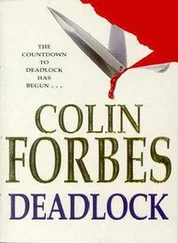Colin Forbes - Year of the Golden Ape
Здесь есть возможность читать онлайн «Colin Forbes - Year of the Golden Ape» весь текст электронной книги совершенно бесплатно (целиком полную версию без сокращений). В некоторых случаях можно слушать аудио, скачать через торрент в формате fb2 и присутствует краткое содержание. Жанр: Шпионский детектив, на английском языке. Описание произведения, (предисловие) а так же отзывы посетителей доступны на портале библиотеки ЛибКат.
- Название:Year of the Golden Ape
- Автор:
- Жанр:
- Год:неизвестен
- ISBN:нет данных
- Рейтинг книги:4 / 5. Голосов: 1
-
Избранное:Добавить в избранное
- Отзывы:
-
Ваша оценка:
- 80
- 1
- 2
- 3
- 4
- 5
Year of the Golden Ape: краткое содержание, описание и аннотация
Предлагаем к чтению аннотацию, описание, краткое содержание или предисловие (зависит от того, что написал сам автор книги «Year of the Golden Ape»). Если вы не нашли необходимую информацию о книге — напишите в комментариях, мы постараемся отыскать её.
Year of the Golden Ape — читать онлайн бесплатно полную книгу (весь текст) целиком
Ниже представлен текст книги, разбитый по страницам. Система сохранения места последней прочитанной страницы, позволяет с удобством читать онлайн бесплатно книгу «Year of the Golden Ape», без необходимости каждый раз заново искать на чём Вы остановились. Поставьте закладку, и сможете в любой момент перейти на страницу, на которой закончили чтение.
Интервал:
Закладка:
Year of the Golden Ape
Colin Forbes
Part one The terrorists
1
In January two major assassinations took place in the Middle East. The new, thirty-year-old King of Saudi Arabia was murdered as he made love to one of his numerous wives, skewered through the back so savagely as he lay prone that the knife blade penetrated the body of the girl beneath him, piercing her heart. An alleged cousin promptly assumed nominal power and issued a statement that he would not rest until Arab troops patrolled the streets of Jerusalem. The statement reassured everyone east of Suez – it showed that the King's heart was in the right place, that he was bent on the extinction of the State of Israel.
But the significant figure in this drama was the man who planned it. Sheikh Gamal Tafak immediately took over the posts of Oil and Finance Minister from his predecessor, who with so many other moderates had fled the country for his life. Tafak, a brilliant fanatic, sincerely believed that to recover Palestine for the Arabs, the oil weapon which chance had placed in their hands must be wielded ruthlessly. It was from this moment that the power of the sheikhs was really exerted against the West.
The oil tap was turned off in January – at the height of a savage European winter – and Tafak himself visited western capitals to inform his nervous hosts that this time, unlike in 1973, there would be no concessions…
'The West must no longer support Israel with so much as a glass of water,' he informed European foreign ministers. 'Until this condition is fulfilled we are cutting the flow of oil to Europe and America by fifty per cent. We are declaring a state of blockade…'
Tafak was in London when the gentle, statesmanlike President of Egypt was assassinated, beaten to death with rifle butts as he slept, by the urgent hammerblows of young soldiers under the direct orders of Colonel Selim Sherif who personally emptied his revolver into the already dying president. Within hours Col Sherif was proclaimed as the new President of Egypt. He reassured the Cairo mob with a speech from a balcony.
The traitor who sat down with our enemies at the same table is dead. In the West they call us apes – we will now show them the real power of the ape…'
Sheriff's reference was to an article by an exasperated Washington correspondent who had dubbed certain autocratic sheikhs as 'golden apes, gold piling up in their treasuries while their people still roam the desert…' Sherif, a clever propagandist, seized on the phrase and broadened it to include the entire Arab nation.
What the West had most feared had happened. The moderate Arab leaders who had struggled valiantly to ease their way forward to cooperation with the rest of the world had been swept aside, buried. As so often happens when vast power is there for the taking, the extremists had climbed into the saddle. In London, shortly after Col Sheriffs balcony speech, Sheikh Gamal Tafak made his own speech at a City of London banquet – much to the consternation of his hosts.
This time there will be no favoured nations as in 1973. The whole of the West must suffer as we are suffering in Palestine -where an alien race oppresses our people, steals their land, turning them into refugees who are stateless persons without a country, without hope…'
The Year of the Golden Ape had begun…
2
By March the new fifty per cent oil cut was squeezing the life out of Europe, America and Japan. The price had climbed to thirty dollars a barrel. Gold, the bellwether of international disaster, was approaching the five hundred dollars an ounce level. And Sheikh Gamal Tafak was flying back to Jeddah from Washington, having told the Americans that he could offer no hope of a respite yet.
For some people it was a nightmare, for others a dream – the destruction of Israel. For Gamal Tafak, a handsome man with dark hair and a dark fringe of beard, it was a dream close to realisation. In only a few months the Arab armies – under the overall command of Col Sherif – would advance and overwhelm the enemy, occupying his country. The occupation would have to be followed by stern measures – to persuade three million Israelis to leave Palestine for ever.
The key to Tafak's plan was to immobilise the West at the critical moment, to make it impossible for them to supply fresh arms to Israel when she was on the point of extinction. As he looked down from the jetliner, now passing over the Aegean, Tafak thought how curious it was – that the plan which would make him the most famous Arab of the twentieth century depended at this stage on two Europeans – an Englishman – and a Frenchman…
Jean Jules LeCat was forty-two years old, a man with a violent past, an unpromising present and a hopeless future. He was intelligent enough to know this, so he was relieved when he was approached secretly by Sheikh Gamal Tafak's right-hand man in Algiers, Ahmed Riad, one week after his unexpected release from the Sante prison in Paris. Riad offered him two hundred thousand dollars to carry out a massacre.
'The English adventurer, Winter, will nominally be in control of the operation,' Riad explained, 'but you will kill the hostages. We do not think Winter is capable of such detachment…'
'He is not,' LeCat replied. 'We worked together for two years in the Mediterranean before I was betrayed and ended up in the Sante. I know Winter. He is squeamish…'
To the average person the proposal might have sounded barbaric, but to LeCat it was a highly dangerous operation Riad had proposed and one to be undertaken because the compensation was so high. His violent past made him view the transaction clinically.
LeCat was the product of a brief liaison between an Arab girl and a French army captain before the Second World War. When the child was born in Constantine, Algeria, LeCat took his son away from the girl who was glad to receive a few hundred francs on condition she never saw the child again. Applying for lea ve, Jules LeCat, the father, took the baby back to France.
Its birth was registered in Toulon where LeCat persuaded a girl friend to pretend to be his wife. A cosmopolitan girl, she was amused by the deception – especially as LeCat's estranged wife was at that moment living in Bordeaux. A doctor, apiednoir, was bribed to provide the requisite documentation, and Jean Jules LeCat became a French citizen.
Brought up by an aunt in Algiers, who was never told the truth – Jules LeCat's real wife conveniently got herself killed in a motor accident shortly after the registration of the birth – the boy went into the Army in 1950 when he was seventeen. His rapid promotion came years later during the ferocious fighting in Algeria when the Arabs were struggling for their independence.
It was an experience which suited his nature. At twenty-seven he became skilled at locating terrorists, at laying traps for them, at torturing information out of the men he caught. He was quickly promoted to captain, his father's old rank. 'To trap a terrorist you must iearn to think like him' was one of his favourite sayings. Later, he added a new maxim. 'You must become a terrorist…'
His father died at the height of the terrible war, and on his deathbed he made a bad mistake. He told Jean Jules the truth about his origins. 'Your mother was an Arab girl out of the Casbah…'
He got no further because Jean Jules, proud of his French citizenship, despising the men he captured and tortured as no more than animals, slapped the dying man hard with the back of his hand. Jean Jules had been two days without sleep and there was still blood on his jacket from a savage engagement in the hills. When he recovered from the shock of what his father had told him, the old man lay dead. He called the doctor, who signed the death certificate without a second thought; after all, the patient had been dying.
Читать дальшеИнтервал:
Закладка:
Похожие книги на «Year of the Golden Ape»
Представляем Вашему вниманию похожие книги на «Year of the Golden Ape» списком для выбора. Мы отобрали схожую по названию и смыслу литературу в надежде предоставить читателям больше вариантов отыскать новые, интересные, ещё непрочитанные произведения.
Обсуждение, отзывы о книге «Year of the Golden Ape» и просто собственные мнения читателей. Оставьте ваши комментарии, напишите, что Вы думаете о произведении, его смысле или главных героях. Укажите что конкретно понравилось, а что нет, и почему Вы так считаете.











